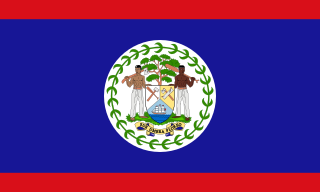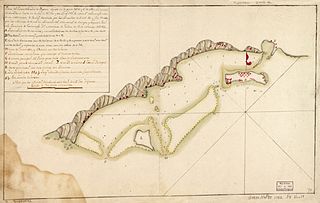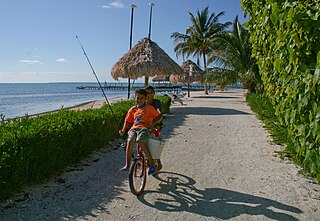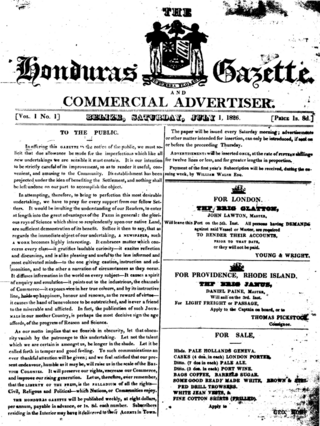
British Honduras was a Crown colony on the east coast of Central America, south of Mexico, from 1783 to 1964, then a self-governing colony, renamed Belize in June 1973, until September 1981, when it gained full independence as Belize. British Honduras was the last continental possession of the United Kingdom in the Americas.

The Maya Mountains are a mountain range located in Belize and eastern Guatemala, in Central America.
Belizean Creoles, also known as Kriols, are a Creole ethnic group native to Belize.
The Battle of St. George's Caye was a military engagement that lasted from 3 to 10 September 1798, off the coast of British Honduras. However, the name is typically reserved for the final battle that occurred on 10 September. The Spaniards had previously attempted to expel the colonists on six occasions, most recently in 1779. The events of 10 September 1798 marked the final Spanish attempt to take over the area. In Belize, the Battle of St. George's Caye is a national public and bank holiday.

The Belizean–Guatemalan territorial dispute is an unresolved territorial dispute between the states of Belize and Guatemala, neighbours in Central America. During the late 1600s and throughout the 1700s, Britain and Spain signed several treaties regarding territories in the Americas. Both nations agreed that the territory of modern-day Belize was under Spanish sovereignty though British settlers could use the land, in specific areas and for specific purposes. The area was never fully under British or Spanish rule at this time and the British settlers continually expanded far past the boundaries set by the treaties. When the Spanish Empire fell, Guatemala said that it inherited Spain's sovereign rights over the territory. Since independence Guatemala has claimed, in whole or in part, the territory of Belize.
The Baymen were the earliest European settlers along the Bay of Honduras in what eventually became the colony of British Honduras.
Belize, on the east coast of Central America, southeast of Mexico, was inhabited by the indigenous peoples who fought off the Spaniards in an attempt to preserve their heritage and to avoid the fate of their neighbors who were conquered and under Spanish rule. While this was going on, British pirates would rob Spanish merchant ships and navigate through the shallow waters and small islands even going up river later to hide their bounty. The indigenous people of Belize did not resist the British like they did the Spanish. In the 17th century, however, the British settlement became a formal British crown colony from 1862 through 1964, where they first achieved self government and later in 1981 became an independent country recognized globally with all its territory intact. The British brought along with them slaves taken from Congo and Angola during the eighteenth century.

The history of Belize dates back thousands of years. The Maya civilization spread into the area of Belize between 1500 BC to 1200 BC and flourished until about 1000 AD. Several Maya ruin sites, including Cahal Pech, Caracol, Lamanai, Lubaantun, Altun Ha, and Xunantunich reflect the advanced civilization and much denser population of that period. The first recorded European incursions in the region were made by Spanish conquistadors and missionaries in the 16th century. One attraction of the area was the availability of logwood, which also brought British settlers.

The Battle of Roatán was an American War of Independence battle fought on March 16, 1782, between British and Spanish forces for control of Roatán, an island off the Caribbean coast of present-day Honduras.
Sir William Burnaby, 1st Baronet was a British naval officer who became Commander-in-Chief, Jamaica Station.

Grace Bank, formerly Barcadares, is an unincorporated hamlet 33 miles up the Belize River. It was the second settlement founded by the first English settlers of present-day Belize. It was settled in the 1650s, relocated in 1760, and resettled in 1853.
The Capture of Cayo Cocina was the result of a Spanish military operation on the 15 September 1779 against a British settlement on Saint George's Caye, just off the coast of present-day Belize, during the Anglo-Spanish War. The settlement was at the time the major British population center in the area, until Spanish forces from the Captaincy General of Guatemala attacked it.

Hispanic and Latin American Belizeans are Belizeans of full or partial Hispanic and Latin American descent. Currently, they account for around 52.9% of Belize's population.

Belize has an embassy and honorary consulates in Madrid, Barcelona and Palma de Mallorca. Spain has a non-resident embassy for Belize in Guatemala, and an honorary consulate in Belize City.
Belizean nationality law is regulated by 1981 Constitution of Belize, as amended; the Belizean Nationality Act, as revised; and various British Nationality laws. These laws determine who is, or is eligible to be, a national of Belize. Belizean nationality is typically obtained either by descent or registration. Descent relies on the principles of jus soli, i.e. by birth in Belize; or under the rules of jus sanguinis, i.e. by birth abroad to parents with Belizean nationality; whereas registration applies to obtaining nationality after birth. There is currently no program in Belize for citizenship by investment, as the previous program lapsed in 2002. Nationality establishes one's international identity as a member of a sovereign nation. Though it is not synonymous with citizenship, rights granted under domestic law for domestic purposes, the United Kingdom, and thus the Commonwealth of Nations, has traditionally used the words interchangeably.

Peter Wallace is commonly held to have been an English or Scottish buccaneer who, in 1638 aboard the Swallow, founded the first English settlement in present-day Belize. Wallace's historicity is debated, first emerging in the 1829 Honduras Almanack; however, several scholars deem him a legendary protagonist of the country's founding myth, rather than an actual historical figure.

Pirates, privateers, corsairs, and buccaneers were active in the Bay of Honduras from the 1540s to the 1860s. This is an annotated, chronological list of such events, with sortable tables provided.

The Anglo-Saxon, English, or Baymen's settlement of Belize is traditionally thought to have been effected upon Peter Wallace's 1638 landing at the mouth of Haulover Creek. As this account lacks clear primary sources, however, scholarly discourse has tended to qualify, amend, or completely eschew said theory, giving rise to a myriad competing narratives of the English settling of Belize. Though none of the aforementioned have garnered widespread consensus, historical literature has tended to favour a circumspect account of a landing near Haulover sometime during the 1630s and 1660s, effected by logwood-seeking, haven-seeking, or shipwrecked buccaneers.

The Honduras Gazette, published as The Honduras Gazette and Commercial Advertiser, was the first newspaper and government gazette in colonial Belize. It ran from 1 July 1826 until sometime during 1829–1838, being succeeded on 29 September 1838 by the Belize Advertiser.
Slavery in Belize includes practices of enslavement by British colonists during the period of European colonization. Products for which slavery was used include logwood, mahogany and sugar.












